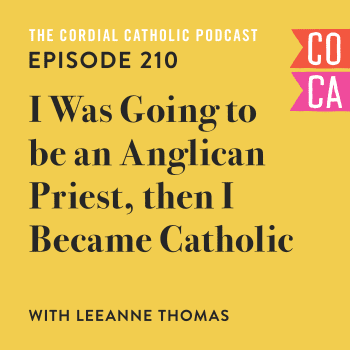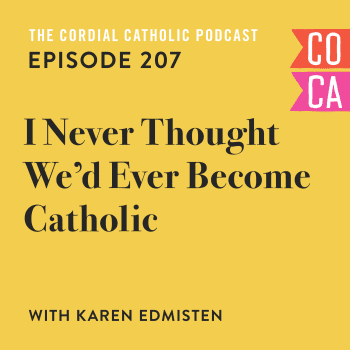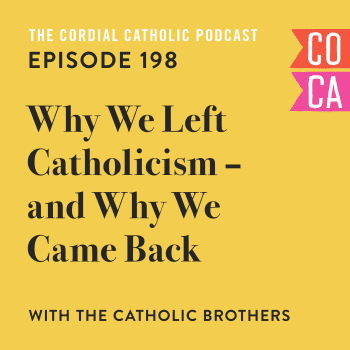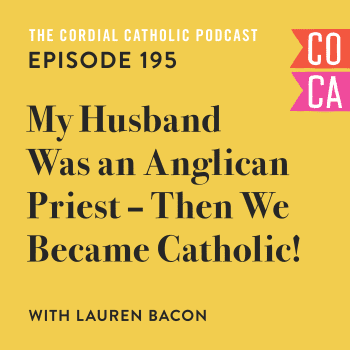
I do not know Rachel Held Evans apart from the fact that she wrote A Year Of Biblical Womanhood and that her blog is incredibly popular amongst many of my evangelical Christian friends. Her articles appear frequently in my Facebook feed although, admittedly, I’ve only read a few. But, recently, an article about Rachel Held Evans, rather than one penned by her, has been appearing with frequency in my social media feeds.
The article, which appeared in the Religion News Service, is an interview with Held Evans about her new book which, I gather, chronicles her departure from evangelicalism and her decision to join the Episcopalian (Anglican) church and it’s been reposted by my friends from all across the Christian spectrum.
So I was naturally intrigued. Because I’ve kind of been there.
The search for truth in evangelicalism is a challenging one. I’ve written, at length, about my own journey from evangelicalism toward Catholicism. This has been my struggle. How, if each person ends up being their own interpreter of the Bible, you end up with an awful lot of interpretations. Which one is correct? Which one is the most truthful? Without becoming a biblical scholar and pouring over the history of interpretation—and learning the ancient languages—how can I ever expect to know which of the fifty shades of Christianity is true?
I’m with Rachel Held Evans on this one. I have one foot out the door of evangelicalism and the other already entering that Catholic Church. I’ve come through the root of which truth is, to quote Stephen Colbert, the most truthy.
But this doesn’t seem to be Rachel Held Evans’s journey. And this doesn’t seem to be the journey for most evangelicals. When we look for the truth, what we really mean is, we look for which truth fits us best.
It’s my contention, instead, that Rachel Held Evans hasn’t ceased to be an evangelical which her decision to become an Episcopalian. Based on her interview, her decision is rather one of the most fundamentally evangelical ones. To find a faith of best fit.
Rachel Held Evans acknowledges that young evangelicals—and I can relate—are searching for a “truer Christianity” but by a “truer” Christianity she seems to mean, “A Christianity that better fits my idea of the truth.” And that’s a fundamentally evangelical orientation.
Held Evans says,
“I felt drawn to the Episcopal church because it offered some practices I felt were missing in my evangelical experience, like space for silence and reflection, a focus on Christ’s presence at the communion table as the climax and center of every worship service, opportunities for women in leadership, and the inclusion of LGBT people.”
Note what’s missing from the evangelical search for the truth: an honest search for the truth.
Because Held Evans explains her draw to the Episcopal church, and it wasn’t because she found it historically closer to the ancient church or more dogmatically in line with the traditions and creeds. Instead, she’s drawn to things like “space for silence and reflection,” the centrality of Communion, and “the inclusion of LGBT people.”
These are not poor reasons to join a church but these are, fundamentally, evangelical reasons. In other words, the Episcopal church is more in line with what Rachel Held Evans sees as true Christianity, and Christian values, and that is why she’s making the shift. Not, importantly, that she’s found more orthodox teaching or more objective truth.
It’s not my intention, in the least, to detract from Held Evans’s journey, experience, or theology. The mission of this blog is to cordially explain my own decision to make the move from an experience of evangelicalism to Catholicism. But what I saw in this interview were intriguing echoes of my own journey, and a kind of conclusion, in her journey, which is juxtaposed to mine.
The evangelical search for truth, in my experience, ultimately ends up in a “better fit” solution. In other words, in finding a church that fits me and my picture of Jesus more accurately. But we’ve got it all backwards. Our journey needs to be oriented not inwards, to our own needs, but outward, to the character of God. To God’s truth. We need to recognize the journey isn’t about finding a worship style or service that’s most edifying but by finding a church that’s the most true. And that takes work—beyond feeling “drawn”. That takes the work of looking at history, the Bible and early church fathers, and that frightening t-word, tradition.
And it doesn’t necessarily mean, in the end, finding a faith expression that does best fit. It might mean adjusting our own thinking and realizing—as shocking as it is—that it isn’t all about us.
I’m not suggesting that Rachel Held Evans’s journey is not authentic, and I’m not suggesting that the truth a person is seeking can’t be found in the Anglican Communion. Those are the last two things I would hope that a reader would take away from this article. I would love to create a rich, honest dialogue. What I am suggesting, and I do it as cordially as possible, is that her journey, like many of ours, is backward. Until we recognize that there is, indeed, an objective, measurable truth we’re looking the wrong way around. Our journey to find an honest expression of our faith can’t put ourselves first—it must be an eyes-wide-open search for the God’s honest truth, wherever that takes us.

















